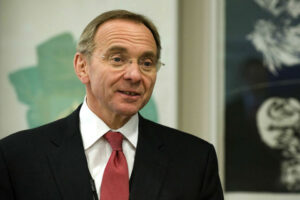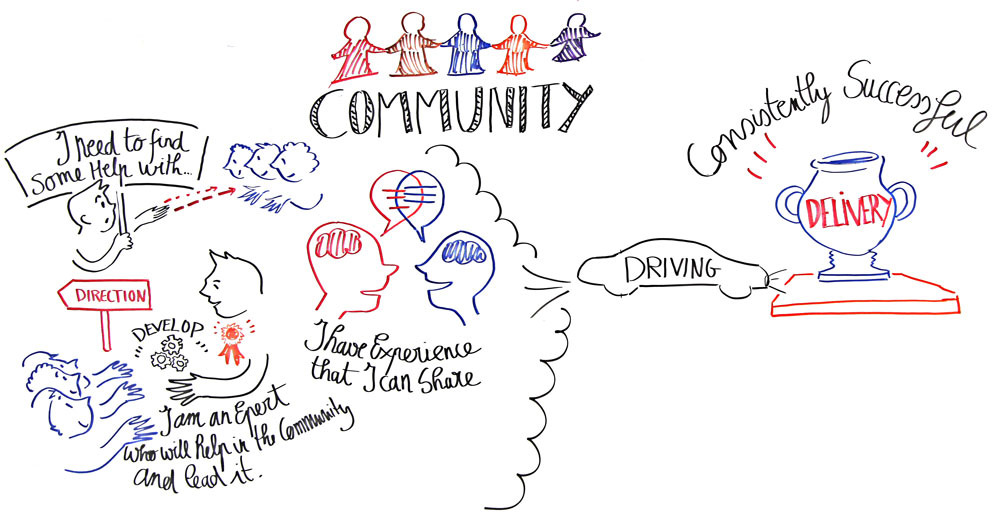
According to Civil Service World, “you can’t go long talking to Manzoni without the words ‘functions’ or ‘delivery’ escaping his lips”. Well, it’s true!
You may well have heard me talk a lot about functions, so I want to set out here what I hope is a simple explanation of what they are and why they are so important.
Basically, functions are all about getting the right expertise in the right place at the right time. For example:
- When negotiating our external commercial deals, why wouldn’t we want to know everything a supplier is doing across government, to ensure we get the best outcome?
- When we’re building a new digital platform, or transforming our IT systems to new and more efficient technology - why wouldn’t departments want a team of experts helping them?
- When we’re managing our properties and our space, and trying to consolidate them into modern, efficient buildings - why wouldn’t we seek advice from specialists?
- Or when we are undertaking a major project, why wouldn’t we want people who have done it before to help us, using tried and tested methodologies to deliver the best outcome?
Essentially, we need to have people who understand the procurement markets to do the procuring for us, just as we need people who understand law to do legal work with us. We are focused on ten core areas: Commercial, Communications, Corporate Finance, Digital, Finance, HR, Internal Audit, Legal, Major Project Delivery and Property. These functions underpin everything we do, working to enable delivery.
These areas of focus are because they are central to delivery, but we don’t today have the experience we need. We have significant other expertise - such as economists, analysts, statisticians - who are all central to the good operation of the Civil Service and are generally organised into professions within government. But the functions I have described above are not developed to the extent we need, and hence the focus on building them.

We need to build on what we have in place today, while at the same time creating career paths that enable people to build deep experience and become experts in delivery and implementation. The future will require such expertise to be a stronger part of the Civil Service.
It’s also about joining-up across departments, where it makes sense to do so. The most obvious example of this is in technology - such as using a single payments platform which several departments share access to, rather than each developing their own system in isolation. Such joining up across departmental boundaries can be coordinated via the function, which otherwise is difficult to achieve.
This is also important in managing our Human Resources: from talent management (ensuring we look across the whole Civil Service to get the best and the brightest), to making sure we don’t all go off and pay completely different rates, or set up competition between departments for scarce skills. The same is true for property, finding out where it makes sense to join-up in buildings and co-locate, and in commercial too - joining up our knowledge on key suppliers so that we aren’t negotiating against ourselves!
Some of the more developed professions, like Communications and Law, do this already - making sure our departmental work has maximum effect - whereas in other areas we’ve developed strong, departmental silos.
The primary axis of decision making in Government is always the department, but sometimes the decisions are better when they are taken mindful of cross departmental considerations, and that is the role of functions. It’s always more complicated when more than one dimension has to be considered, and that is why we have to be sure that the functional lens is adding genuine value to any decision. But when we get that balance right, the outcome is always better.
The functional structure within government must be flexible and one size will not fit all. The functional model allows government to bring expertise to bear on key decisions, across a range of areas and departments. It will flex so that we can collaborate when it makes sense to, up our game in dealing with the outside world, improve our delivery capability, and crucially, gain access to efficiencies that are simply not available on a department by department basis.
In other words - functions will help us all move the Civil Service to the next stage in its evolution, and make us even better at what we do. This isn’t just about being efficient, it’s about taking pride in delivering the best possible public services.
There are bound to be some bumps along the way as we develop this - and no doubt we’ll need to adapt as we go to ensure this fits with all the complexities unique to our organisation. Developing deep functional expertise isn’t simply a branding exercise - there are difficult questions for us still to consider and resolve. But I’ve seen the difference functional expertise makes in other large and complicated structures - and I know we can achieve the same, if not far more, in the Civil Service.
You can read more about the functional model and what each of the different functions do here.

10 comments
Comment by Susan Chan posted on
I would like to see more formal attention on managing and retaining knowledge within the Civil Service. Knowledge management is a function that crosses over the identified 10 core functions, but remains largely unrecognised by line managers of holding much value to the organisation. Others too have recognised the lack of knowledge management as an issue:
1. In March 2015 the Commons Public Administration Select Committee (PASC) identified that there is no focus on building knowledge management in the Capabilities Plan. (http://www.parliament.uk/business/committees/committees-a-z/commons-select/public-administration-select-committee/news/report-civil-service-skills/).
2. History and Policy (www.historyandpolicy.org) told the Chartered Institute of Librarians and Information Professionals (CILIP) that there is an absence of any training provision in knowledge management in Civil Service Learning. (CILIP update April 2015)
Knowledge managers across the UK central government formed a community in 2014 to address issues facing organisations. This is an informal group that meets voluntarily and is coordinated by representatives from 3 government departments. It might be a good place to start the conversation.
Comment by Stephen posted on
There is nothing wrong with bringing consultants, and consultancy thinking, into public services. But can there please be a moratorium, enforced at Cabinet Office level, on twee cartoons that illustrate themes like collaboration and delivery, while contributing nothing of any merit to the discussion? If the relationship between concepts needs to be explained in a diagram, use blocky powerpoint boxes, and let the thinking stand up on its own.
Comment by Mark posted on
John, I think Steve's comment of 17/4/15 about subject matter expertise hits the nail on the head. I looked at your 10 functions, but where do we peg nuclear suitably qualified experienced personnel (SQEP)? I know this to currently be a critical weakness attracting a huge market skills supplement to prevent loss of skilled staff to the private sector. Unless you recognise the need for deep technical expertise within the functional areas your strategy will fail. Even if the intent is to buy in technical expertise your buyers (commercial function?) will need knowledge, or access to knowledge (i.e. SQEP), regarding the thing they are buying to avoid the risk of being sold a "pup", to use a car buying metaphor.
Comment by Steve posted on
I would be interested to know where policy fits in. Is it one function? There are certainly a lot of common skills for policy work across departments. But then what about subject matter expertise? I would also be interested to hear more about the science function. Scientists are not currently managed as a single profession as economists and statisticians are. This might be right - science is a varied area- but it has led to a lack of focussed professional development and career paths.
Comment by Marian posted on
John Manzoni says "We have significant other expertise – such as economists, analysts, statisticians – " that is true - and right so long as these staff with the said areas of expertise do not go on to think that only they have the capability and understanding to do other specialisms as well and have the power to enforce this eg project management, IT development. I believe this is a contributory factor in projects failing and IT becoming fragmented across government.
Comment by Phil Goodliffe posted on
A lifetime's experience in all 4 sectors tells me you're 100% right and I wish you every success. I could furnish lots of examples (from blue chipo multi-nationals) but one of the best is in Michael Crichton's "Disclosure" (pg 252 of most paperback editions).
What David Sainsbury said to you at IFG is important if not crucial - if you are to succeed, you need to at least understand the policy link between delivery and Ministers (if not address it simultaneously). As just one example (and I have many others), why did news of Ash Die Back's 7-year westward progress across Europe not reach Defra Ministers until it was too late? Because the intelligence was judged by generalists at the interface with Ministers and so never reached them....
Comment by Dave H posted on
Please correct the first quote which currently reads "who can are all central to the good operation", I believe the "can" should be deleted.
On a different point, the cartoons and overall tone of the article is condescending. It would be more honest if it set out that part of the aim of centralising "functions" across departments is to provide the "function" with fewer staff.
Comment by Jodey Flynn posted on
If function is the new buzz word, I seriously hope that it is followed by ACTION. Almost 2 1/2 years ago I brought to the attention of the Department that the DWP Benefit Centres no longer receive notifications from Carers Allowance that a customers claim has been closed.There has still been no action and thousands of pounds are being written off as wholly official errors not to mention the time wasted for past period overpayments being reactioned. Function yes brilliant but ACTION is what the DWP need that and listening to the Employees on the ground that want to help make the DWP a more functioning government department.
Comment by Rossana Roby posted on
Hi John
I find this extremely interesting. I think we have to get out of the mindset that we work for a Government and maybe think of it as a company and although we don't actually work on profit we do have to consider costs. Employing someone who has a history of buying for instance to get the best deals across each Government department, whether it be stationary supplies, uniforms, travel and all other commercial deals are needed.
I think we need to ensure we create true career paths. We need proper development that will help staff see exactly where they fit in, what their strengths and challenges are, how they can improve and what career path is best for them and the business. I agree with the need for flexibility and see no reason why a particular skill should not be used across departments. We are all civil servants working for one 'company' and if one part of the company needs extra resourse for any given time our staff should be trained to be able to assist.
My mind is whirling with the endless possibilities and how exciting it will be to be a part of something that is evolving and growing. Your job must be so interesting and I should imagine a great job to shadow.
Ciao Rossana
Comment by Martin Allman posted on
To the ten core areas listed can we add Security (including Information Management). One of the main risks any department faces is that of cyber attack or the unauthorised disclosure of data.